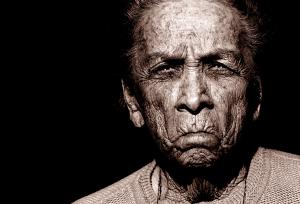 You might say that the early Roman historian Tacitus was the first myth-maker of the “noble savage:” the popular idea that human beings live simpler, more peaceful and egalitarian lives when they’re not encumbered by the dead weight of civilization. Back in the 1st century, Tacitus was enamored with ancient Germans, seeing the northern barbarians as a noble, freedom-loving people, free from the status jockeying and tyranny that Romans endured. Stressing the Germans’ egalitarianism, he even reported that their kings lacked power to command anyone. To Tacitus, northern Europe was a fierce, free land, peopled by lovers of liberty who disdained hierarchy and oppression.
You might say that the early Roman historian Tacitus was the first myth-maker of the “noble savage:” the popular idea that human beings live simpler, more peaceful and egalitarian lives when they’re not encumbered by the dead weight of civilization. Back in the 1st century, Tacitus was enamored with ancient Germans, seeing the northern barbarians as a noble, freedom-loving people, free from the status jockeying and tyranny that Romans endured. Stressing the Germans’ egalitarianism, he even reported that their kings lacked power to command anyone. To Tacitus, northern Europe was a fierce, free land, peopled by lovers of liberty who disdained hierarchy and oppression.
The French philosopher Jean-Jacques Rousseau is often incorrectly credited (or blamed) with popularizing the noble savage idea in early modern France, but Tacitus shows that the yearning for a simpler, less hierarchical existence outside civilized society has much deeper roots. Today, the noble savage trope shows up in films, in paintings, and even in contemporary literature. The 1991 environmentalist novel Ishmael, for example, distinguishes between “Takers,” civilized people whose love of dominance is driving the world toward ecological catastrophe, and “Leavers,” humble hunter-gatherers who trust in the provisions of nature. The author, Daniel Quinn, saw agriculture in particular as the root of humanity’s problems, including wealth hoarding and hierarchical ideologies.
In a less (explicitly) romanticized way, modern anthropology and archeology also see agriculture as the pivot point in human prehistory. According to this view, the neolithic revolution, thought to have begun around 12,000 years ago, saw our ancestors start to abandon their nomadic, hunter-gatherer ways and plant the first crops. The new agricultural economy led to the first permanent settlements, the first temples, the first irrigation — and a big uptick in social hierarchy. Beforehand, the thinking goes, nobody could store up goods or become wealthy. Lacking property distinctions, the hunter-gatherer world was an egalitarian one, the “original affluent society.”
Hierarchy and Hunter-Gatherers
But this modern view of foraging culture might be just as fanciful as Tacitus’s romanticized picture of ancient Germany. In an article in Aeon, Manvir Singh, an anthropologist at the Institute for Advanced Study in Toulouse, argues that humans are inherently capable of both egalitarian and hierarchical lifestyles. There’s therefore little reason to think that the whole human race were egalitarian hunter-gatherers prior to agriculture. To the contrary: many recorded hunter-gatherer societies have been hierarchical, with social ranks, chiefs, and even priests.
For example, the American Indians of the Pacific Northwest were foragers and fishers who nonetheless lived in sedentary, permanent villages complete with aristocracies and slavery. Individual men accumulated wealth and traded it for status using enormous feasts called potlatches. The surrounding ecology was simply rich enough to support a hunter-gatherer economy as well as social stratification.
Similarly, when Spanish conquistadors first began exploring Florida, the powerful Calusa tribe occupied much of the southern peninsula. The Calusa boasted a capital city, a king, distinctions between commoners and nobles, and a bountiful economy based on fishing:
At the time of Spanish contact, they comprised 50 to 60 politically united villages along Florida’s southwest coast, although their domain extended far beyond that, from Tampa to Cape Canaveral and down to the Florida Keys: an area twice as large as modern-day Belgium. They collected tribute from client villages in the form of mats, hides, captives, feathers and breads made of roots. In return, they offered protection.
But what about the reams of 20th-century ethnography supposedly showing that contemporary hunter-gatherers are politically egalitarian? As the influential anthropologist David Boehm has argued, most of the small-scale societies we know from ethnography don’t have strong leadership. Instead, leadership in foraging societies is informal, provisional, and never settled. The most socially skilled or talented men in the band might influence others through example or persuasion. But they can command only others’ respect, not their obedience.
The San people, sometimes called Bushmen or the !Kung, are often lauded as the classic example of mobile, egalitarian hunter-gatherers today. Living in the Kalahari Desert of southern Africa, the San people don’t have formal political leaders or strong authority. Nobody can order anyone else to do anything. Decisions are reached by consensus. Religious ceremonies are limited to all-night trance-dancing sessions around a fire — none of the ritual pageantry or formality that you’d find at a British coronation: no church, no crown. Many writers have assumed that this, then, is the original human social phenotype, a living remembrance of how all humans lived for the long, peaceful millennia before agriculture.
A Spectrum of Potential
But there’s a catch: the current San lifestyle is probably a recent one. Citing anthropologists Lee Richard Lee and Jacqueline Solway, Singh writes that
!Kung society was less a pristine surrogate and more the product of a ‘long interaction between foragers, farmers, and herders’. The !Kung started trading with Bantu agriculturalists between 500 and 1,500 years ago. In the 1920s, Bantu farmers and herders entered !Kung lands so that, by the 1950s, the !Kung were incorporated into a larger pastoral economy.…
These interactions shaped !Kung society. According to Polly Wiessner, a leading anthropologist who has spent nearly four decades studying the !Kung, the egalitarianism for which the !Kung are so famous is a reflection not of a general hunter-gatherer lifestyle but of Bantu farmers displacing local leaders. ‘There’s indication that [the !Kung] had much stronger leadership,’ she said. ‘And they had some clan-like system that we can’t understand anymore and a more complex social organisation.…’
The possibility that modern-day hunter-gatherer societies may actually be the product of recent, stressful interactions with other societies is a challenge for the hypothesis of original egalitarianism. But that hypothesis may be in need of challenging. Singh suggests that
If anything, it’s the profusion of mobile, egalitarian bands that might be the historical outlier. Rather than reflecting ancient ways, these small-scale societies are often products of modern forces. Rather than being untouched, many have been bullied, pacified, employed, enslaved and marginalised by colonial powers and agricultural neighbours.
Singh’s argument echoes one made several decades ago by the anthropologist and cultural theorist Mary Douglas, who saw human social structure as intrinsically flexible. Rather than a linear march toward or away from egalitarianism, she argued that history and ethnography reveal a sort of random walk. Some societies grow more hierarchical over time. Some lose their hierarchies and become more egalitarian. Rather than everything resting on the presence or absence of agriculture, social and even ideological or religious factors can drive the transition of a given society toward or away from hierarchy. In modern Africa, for example, Douglas wrote that the complexity (or lack thereof) of the indigenous societies studied by 20th-century anthropologists was often a function of recent political history, not default human tendencies:
the colonial regime itself provided the insulation and protection from the effects of war and famine. It tended to freeze the native social systems into patterns of reinforcement and stability.…However the effect was not the same in Central Africa as it was in Ghana. Here the long nineteenth-century wars with Arabs and other slave-raiders had already long broken up the local social structures before the colonial freeze came down.
Anthropologists in central Africa often encountered and recorded societies with relatively weak leadership systems, but this wasn’t because these societies reflected some timeless, roughly egalitarian human default — at least not any more than the intact, hierarchical societies in west Africa reflected a hierarchical default. Both kinds of societies simply resulted from recent historical events, and the European colonial regimes “froze” them in place for a few decades. Those decades just happened to be the ones when many anthropologists carried out their most important, seminal studies, leaving scholars with false, or at least incomplete, impressions about African society.
Animal Hierarchy
The argument that egalitarianism isn’t a human default makes biological sense. All of our closest relatives — chimpanzees, gorillas, and bonobos — have dominance hierarchies. Even bonobo males establish ranking relationships. In fact, dominance hierarchies are universal across the animal world. Put three cats in a house together, and they’ll figure out a pecking order. Same with dogs, hamsters, rats — you name it. No matter how social the animal, social relationships contain a strong element of ranking. To be fair, David Boehm acknowledges our hierarchical tendencies, arguing that egalitarian hunter-gatherer bands actively suppress status-seeking individuals, in what he calls “reverse dominance hierarchies.”
But keeping would-be leaders tamped down requires nonstop vigilance. Is it really plausible that the entire human race managed to succeed in this endeavor, without interruption, for 140,000 years before neolithic revolution? Probably not.
Enforced egalitarianism also comes with its own drawbacks. Writing in the 19th century, Alexis de Tocqueville observed that American Indian tribes often lost battles against European soldiers because, lacking strong leadership, they couldn’t coordinate as well as the Europeans did. Even Tacitus acknowledged that the ancient Germans’ supposed love of freedom had downsides:
Their (Germans’) freedom of spirit involves a drawback, in that they do not assemble all at the same time or as if commanded, but take two or three days over it, hanging back.
By contrast, the Roman troops that elites like Tacitus commanded were intensely disciplined, quick to obey orders, and easy to coordinate. Their disciplined obedience to defined chains of command helped them conquer the entire Mediterranean Basin, leaving the Roman cultural legacy across a vast swathe of land to the present day. This isn’t to argue that Roman culture was morally superior from a God’s-eye view. It just means that, in the jostling competition for resources that comprises so much of human life, hierarchy is often a winning strategy.
Egalitarianism and Competition
Paradoxically, another drawback of political egalitarianism may be endemic competition. In a formal leadership structure, positions are generally settled and fairly stable. An army lieutenant who wants to become a general has to spend years climbing the ranks, gaining experience, mastering the ropes. Colonels and generals therefore don’t have to worry that some ambitious hotshot is going to try to knock them off their pedestal right in the middle of a battle. People know where they stand in relation to one another.
But structurally flatter societies still have hierarchies. These hierarchies are simply informal, and so more fluid and often more open to constant reconfiguration. This openness makes it potentially possible for anyone to gain status — by having a good hunting streak, by singing a particularly good song around the fire. But it also means that everybody might be a potential rival. As Mary Douglas argued, an open and fluid social structure is therefore often also a deeply competitive one.
At the same time, the opportunities for advancement that an informal hierarchy actually offers can be slim. Remember that leaders in egalitarian societies gain their high positions through prestige and respect. They can’t boss anybody around, but they can use their high status to influence others, persuade the group to make the decisions they want. Their high prestige makes them attractive as friends — and as mates.
But prestige and respect come from things like physical appearance, social skills, talent. Not everybody has these gifts in abundance. In fact, studies of politically egalitarian hunter-gatherers in South America show that informal hierarchies among men are extremely steep. A few men get almost all the respect and prestige, almost all the social capital. In a paper in the Journal of Cognition and Culture, my colleagues and summarized these and similar findings:
(D)espite lacking formal political leadership, acephalous (i.e., leaderless) societies (1) exhibit significant informal social inequality that (2) has empirical impacts on fitness-related and psychosocial outcomes and which (3) appears to be steeper and more consequential for men than for women. By definition, such informal hierarchies offer few offices, or defined roles insulated from competition or social shifts. Where inequalities in resources or formal social rank are minimal, positions of respect or influence are thus often “fluid, open, and contested” (McCaffree, 2015, p. 97).
This informality can be particularly stressful for low-status men. In a formal hierarchy, everybody might have at least some kind of role, a defined position that gives them recognition. In a structurally flat community without defined ranks, if you’re a poor hunter, funny-looking, and a lousy musician…well, life can be hard, even if nobody can officially boss you around.
The Enduring Appeal of the Noble Savage
The appeal of the noble savage myth isn’t hard to understand. Life is hard. Some people seem to get all the luck and others get shafted. We have to play by social rules that we often dislike in order to get by. It makes sense that we’d gravitate toward romanticized stories about a pre-civilized past when everyone was equal, when nobody could dominate anyone else, when there were no rich people and no poor people. In some circles in contemporary Western society, this story has become a kind of soteriology or utopian worldview, leading followers to become anarcho-primitivists who advocate the end of civilization and a return to a more natural, non-hierarchical state.
But the facts are probably not in the utopians’ court. Hierarchy is a ubiquitous feature of the social behavior of all animals, from beetles to humans. Before there were kings and presidents and oil tycoons, there were what Thomas Jefferson called the “natural aristocracy:” people who, by accident of birth, were simply more talented, attractive, and able to garner others’ respect and deference than others. In egalitarian societies, these native talents might not be able to give orders. But they’re perfectly able and willing to receive gifts, carry on affairs with lots of women, learn through the grapevine where the good opportunities are before everyone else — the intangible “goods” that define the informal economy. Maybe this is why, in many societies, a large percentage of men fail to have children, even if their wives have babies (you get the implication there).
We’d love to have a world where we don’t have to compete with each other. We don’t want there to be losers. We really don’t want to be losers ourselves. But hierarchy is inevitable. The noble savage myth and its close cousin, the cherished belief that humanity is egalitarian by default until it’s corrupted by civilization, are both literally that — myths, stories whose psychological functions are symbolic-ideological, not factual. The reality is that, as Singh argues, “We’re egalitarian, yes, but also predatory and hierarchical.” Like the American poet Walt Whitman, we humans inherently “contain multitudes.” It’s fitting that that Whitman, famously anti-authoritarian and egalitarian, nonetheless used his talent to end up at the top of the literary pack. To coin a phrase, hierarchy finds a way.
___
Tonight, May 20th, 2021, my colleagues and I are hosting a lecture on interdisciplinarity in academic research by Paul Cassell, a systems theorist and religious studies scholar at Arizona State University and author of Religion, Emergence, and the Origins of Meaning. This lecture is the first public offering of our new initiative Scholarium. There are still a few spots available — sign up here.
___
Edit: I altered the second paragraph slightly after publication to eliminate a redundant phrase.












